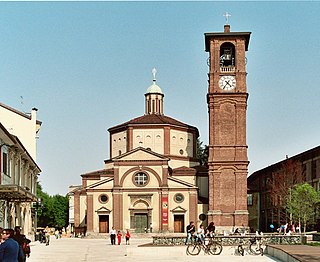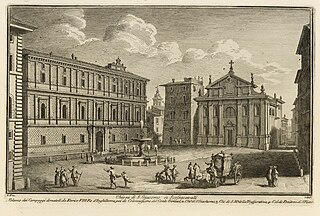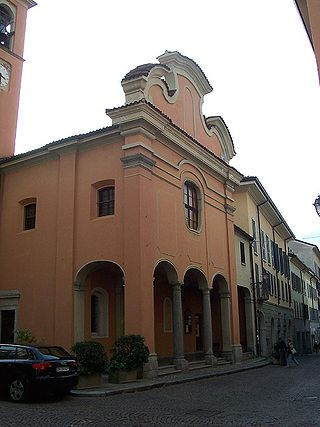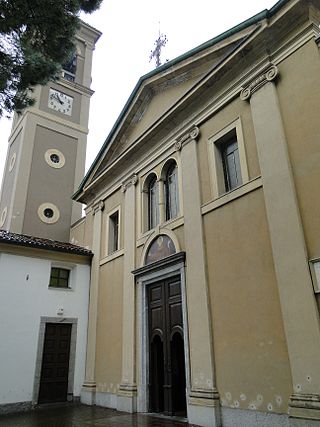Related Research Articles

Pistoia is a city and comune in the Italian region of Tuscany, the capital of a province of the same name, located about 30 kilometres (19 mi) west and north of Florence and is crossed by the Ombrone Pistoiese, a tributary of the River Arno. It is a typical Italian medieval city, and it attracts many tourists, especially in the summer. The city is famous throughout Europe for its plant nurseries.

Giovanni Battista Tiepolo, also known as GiambattistaTiepolo, was an Italian painter and printmaker from the Republic of Venice who painted in the Rococo style, considered an important member of the 18th-century Venetian school. He was prolific, and worked not only in Italy, but also in Germany and Spain.

Lecco is a city of 48,131 inhabitants in Lombardy, northern Italy, 50 kilometres (31 mi) north of Milan. It lies at the end of the south-eastern branch of Lake Como. The Bergamo Alps rise to the north and east, cut through by the Valsassina of which Lecco marks the southern end.
Caldogno is a town and comune near Vicenza in Italy. It has a population of 11,337 inhabitants.

Diano Castello is a comune (municipality) in the Province of Imperia in the Italian region Liguria, located about 90 kilometres (56 mi) southwest of Genoa and about 5 kilometres (3 mi) northeast of Imperia. As of 31 December 2004, it had a population of 2,061 and an area of 6.0 square kilometres (2.3 sq mi).
Prata di Pordenone is a comune (municipality) in the Regional decentralization entity of Pordenone, in the Italian region of Friuli-Venezia Giulia, located about 100 kilometres (62 mi) northwest of Trieste and about 8 kilometres (5 mi) southwest of Pordenone.

Bernardino India (1528–1590) was an Italian painter of the late Renaissance, born and mainly active in Verona.

San Marco is a church in Milan, northern Italy.

The Chiesa della Santissima Trinità dei Pellegrini is a Roman Catholic church located on Via dei Pettinari #36 In the rione of Regola of central Rome, Italy. It stands a block away from the Palazzo Spada on Via Capo di Ferro, while a few blocks away on the Via dei Pettinari stands the Ponte Sisto.

The Basilica of Saint Magnus is the principal church of the Italian town of Legnano, in the Province of Milan. It is dedicated to the Saint Magnus, who was Archbishop of Milan from 518 to 530. The church was built from 1504 to 1513 in the Renaissance-style designed by Donato Bramante. The bell tower was added between the years 1752 and 1791. On 18 March 1950, Pope Pius XII named the Basilica of San Magno a minor basilica.

Valentino Rovisi was an Italian painter in a late Baroque style.

The Collegiate Church of St Florentius is a Gothic style, Roman Catholic collegiate, now parish church, in Fiorenzuola d'Arda, in the Province of Piacenza, region of Emilia-Romagna, Italy.

San Giacomo Scossacavalli was a church in Rome important for historical and artistic reasons. The church, facing the Piazza Scossacavalli, was built during the early Middle Ages and since the early 16th century hosted a confraternity which commissioned Renaissance architect Antonio da Sangallo the Younger to build a new shrine. This was richly decorated with frescoes, painted by mannerist artist Giovanni Battista Ricci and his students. The church was demolished in 1937, when Via della Conciliazione was built and the piazza and central part of the Borgo rione were demolished. Many decorative elements still exist, since they were preserved from demolition.

San Michele e San Francesco is a renaissance-style, Roman Catholic parish church located in the Piazza SS Francesco e Michele in the town of Carmignano, province of Prato, region of Tuscany, Italy. It is best known for housing the Jacopo Pontormo altarpiece of the Visitation.
The Sanctuary of Santa Maria Gloriosa is a Roman Catholic parish church in the neighborhood of Rancio Superiore in the town limits of Lecco, region of Lombardy, Italy.

Santa Marta is a Roman Catholic church building located in the town of Lecco, region of Lombardy, Italy.

Santi Materno e Lucia is a Roman Catholic parish church and former Convente of the Cappuccini are located on Piazza San Cristoforo in the neighborhood of Pescarenico in the town of Lecco, region of Lombardy, Italy.
Serafino Morazzone was an Italian Roman Catholic priest. Morazzone served as a simple parish priest in Lecco from his ordination as a priest in 1773 until his death and became noted amongst the faithful for his personal holiness and dedication to the sacraments.

San Giovanni Battista is a Gothic and Romanesque style, Roman Catholic church located in Piazza San Giovanni in the historic center of Gubbio, Umbria, in Italy.

San Giovanni Battista is a Renaissance-style Roman Catholic parish church located in Largo San Domenico near Corso dei Vestini, in the historic center of the town of Penne, region of Abruzzo, Italy. The church is accessible only through stairs along a narrow alley.
References
- ↑ Comune of Lecco, entry on church.